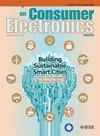A Privacy-Preserving Framework for Efficient Network Intrusion Detection in Consumer Network Using Quantum Federated Learning
IF 4.3
2区 计算机科学
Q1 ENGINEERING, ELECTRICAL & ELECTRONIC
引用次数: 0
Abstract
The proliferation of consumer networks has increased vulnerabilities to network intrusions, emphasizing the critical need for robust intrusion detection systems (IDS). The data-driven Artificial Intelligence (AI) approach has gained attention for enhancing IDS capabilities to deal with emerging security threats. However, these AI-based IDS face challenges in scalability and privacy preservation. More importantly, they are time-consuming and may perform poorly on high-dimensional and complex data due to the lack of computational resources. To address these shortcomings, in this paper, we introduce a novel framework, called Quantum Federated Learning IDS (QFL-IDS), that merges Quantum Computing (QC) with Federated Learning (FL) to allow for an efficient, robust, and privacy-preserving approach for detecting network intrusions in consumer networks. Leveraging the decentralized nature of FL, QFL-IDS enables multiple consumer devices to collaboratively train a global intrusion detection model while preserving the privacy of individual user data. Furthermore, we leverage the computational power of quantum computing to improve the efficiency of model training and inference processes. We demonstrate the efficacy of our framework through extensive experiments. The obtained results show significant improvements in detection accuracy and computational efficiency compared to the current traditional centralized and federated learning approaches. This makes QFL-IDS a promising framework to cope with the new emerging security threats in a timely and effective manner.利用量子联合学习在消费者网络中实现高效网络入侵检测的隐私保护框架
消费者网络的扩散增加了网络入侵的脆弱性,强调了对强大的入侵检测系统(IDS)的迫切需求。数据驱动的人工智能(AI)方法因增强IDS能力以应对新出现的安全威胁而受到关注。然而,这些基于ai的IDS在可伸缩性和隐私保护方面面临挑战。更重要的是,由于缺乏计算资源,它们非常耗时,并且可能在高维和复杂数据上表现不佳。为了解决这些缺点,在本文中,我们引入了一个新的框架,称为量子联邦学习IDS (QFL-IDS),它将量子计算(QC)与联邦学习(FL)相结合,从而提供了一种高效、健壮且保护隐私的方法来检测消费者网络中的网络入侵。利用FL的分散特性,QFL-IDS使多个消费者设备能够协同训练全局入侵检测模型,同时保护个人用户数据的隐私。此外,我们利用量子计算的计算能力来提高模型训练和推理过程的效率。我们通过大量的实验证明了我们的框架的有效性。所获得的结果表明,与当前传统的集中式和联邦式学习方法相比,检测精度和计算效率有了显著提高。这使得QFL-IDS成为一个有前景的框架,可以及时有效地应对新出现的安全威胁。
本文章由计算机程序翻译,如有差异,请以英文原文为准。
求助全文
约1分钟内获得全文
求助全文
来源期刊
CiteScore
7.70
自引率
9.30%
发文量
59
审稿时长
3.3 months
期刊介绍:
The main focus for the IEEE Transactions on Consumer Electronics is the engineering and research aspects of the theory, design, construction, manufacture or end use of mass market electronics, systems, software and services for consumers.

 求助内容:
求助内容: 应助结果提醒方式:
应助结果提醒方式:


